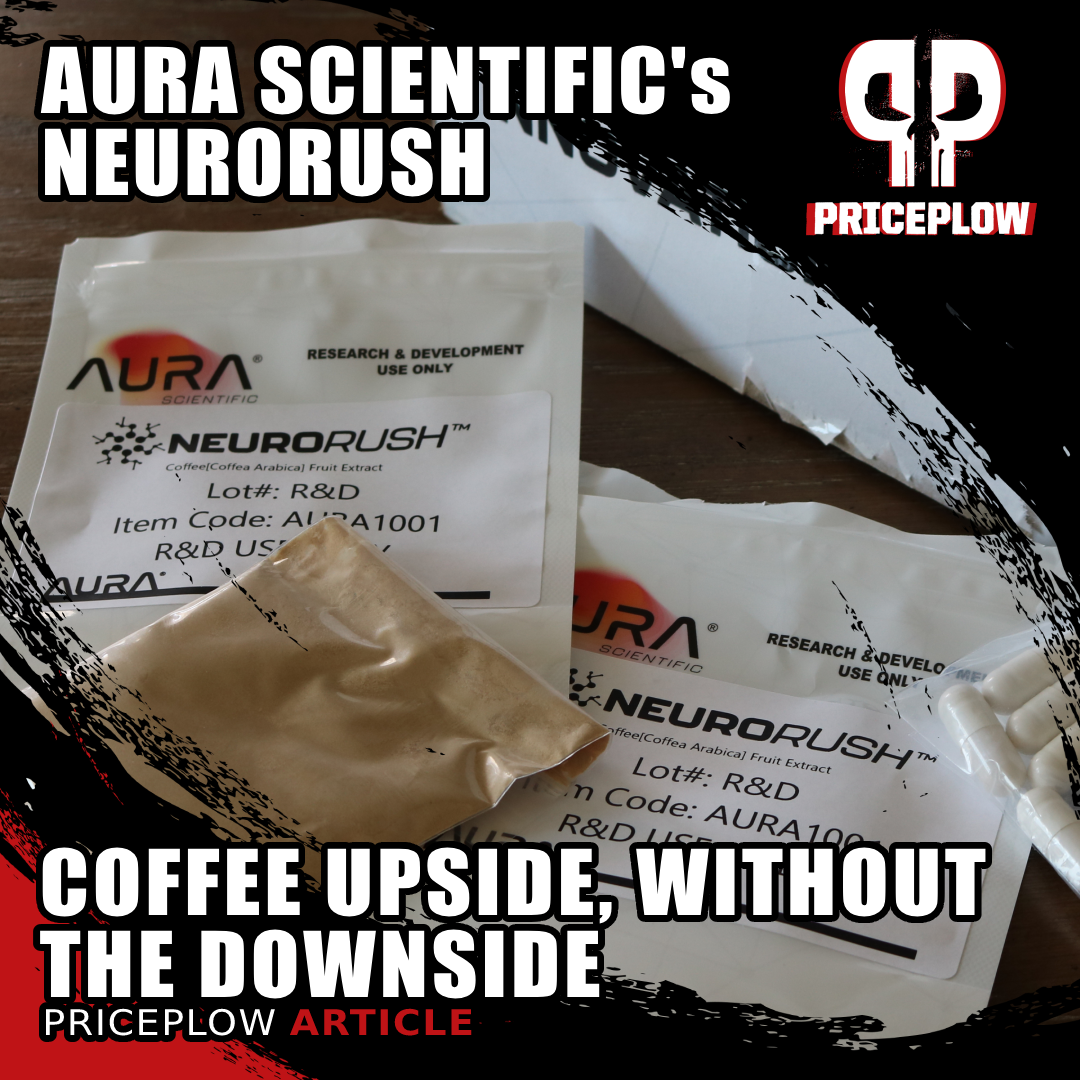
Aura Scientific's NeuroRush brings the cognitive perks of coffee without the taste! High in polyphenols like chlorogenic acid, it supports memory, focus, and steady energy by enhancing glucose metabolism and reducing cognitive fatigue. Perfect for long-lasting mental clarity.
Modern life is a workout, and as we navigate it, we're subjected to high levels of stress. Unfortunately, the unprecedented demands on our minds come at a time when the brain is more important than ever for determining professional success and life outcomes.
So what do we do to support this vital organ of knowledge and productivity? For most of us, the answer can be summed up in a single word: coffee.
Coffee is Popular For a Reason
A large majority of American adults drink coffee to keep up with life's demands, a practice that makes a lot of sense: coffee is loaded with beneficial nutrients and phytochemicals like polyphenol antioxidants, chlorogenic acid, quercetin, and other bioactive constituents that directly counter the harmful effects of oxidative stress and inflammation on the brain. A growing body of research shows that coffee consumption is linked to a decreased risk for "diseases of civilization" like mood disorders[1] and metabolic dysfunction,[1] much thanks to these compounds.
Considering caffeine and coffee’s methylxanthine compounds
Yet, as most of us know, coffee's also loaded with stimulant alkaloids like caffeine, theobromine, and theophylline. This complicates the picture: caffeine provides an immediate energy lift by blocking adenosine receptors in the brain,[2] effectively reducing fatigue and promoting wakefulness. For those managing demanding schedules or needing quick mental clarity, this effect is invaluable. Unfortunately, in susceptible individuals, these compounds can have negative effects like disrupted sleep, anxiety, or even hypertension.[3]
Anyone who's explored the coffee research knows that, theoretically, most people shouldn't have major issues with regular coffee consumption. However, not everyone wants to be permanently hooked on the stimulants.
Taking the polyphenols for a boost, keeping the stimulants optional
What if we can get many of the vitality-boosting effects from coffee without high doses of those compounds? This allows us to either get the benefits of the other polyphenols in a very low-stimulant fashion, or amplify the caffeine that's already in our energy drinks, pre-workout supplements, and thermogenic products.
And Aura Scientific has delivered it, in the form of their ingredient, NeuroRush.
Aura Scientific’s NeuroRush – Coffee’s Upside, Without The Downside
NeuroRush is a coffee fruit extract, standardized for all the beneficial bioactive constituents in coffee, keeping the stimulants at bay. In other words, NeuroRush is formulated to deliver the cognitive benefits of coffee without the downsides of caffeine dependency, jitteriness, or sleep disruption.
This allows for maximum formulation flexibility:
- Use it alone for many of coffee's non-stimulatory benefits, or
- Combine it with caffeine anhydrous (or paraxanthine) to provide a more natural feel in energy drinks, pre-workout supplements, and nootropics.
NeuroRush utilizes the powerful polyphenols and chlorogenic acids found in coffee fruit to provide neuroprotection. Just as in regular coffee, these compounds reduce oxidative stress in the brain, combatting the wear and tear associated with cognitive decline and helping to sustain mental resilience. Chlorogenic acids also support blood flow to the brain, enhancing oxygen and nutrient supply, which promotes mental energy and alertness naturally.[4]
Additionally, NeuroRush replicates much of caffeine's benefit by improving mood and vitality through neurotransmitter function, particularly dopamine, which is crucial for motivation and well-being.
While NeuroRush is a relatively new ingredient with limited NeuroRush-specific research, numerous studies on coffee extract can offer insight into how NeuroRush works. Let's take a look at them:
-
Neurophysiological Effects of Whole Coffee Cherry Extract in Older Adults with Subjective Cognitive Impairment (2021)
This study looked at the effects of a single 100 mg dose of whole coffee cherry extract (WCCE) on neurophysiological and cognitive functions in older adults with subjective cognitive impairment (SCI), which is a self-reported experience of memory problems or cognitive difficulties that are noticeable to the individual but not detectable in objective cognitive testing or clinical assessments. People with SCI often report issues with memory, attention, or problem-solving abilities, even though their performance on cognitive tests remains normal. This contrasts with conditions like mild cognitive impairment (MCI), where subtle cognitive deficits are objectively measurable and sometimes progress to dementia.[5]
SCI is an early warning sign of potential cognitive decline, and people with SCI have a higher risk of developing more severe cognitive impairments over time.[6] Therefore, it is of paramount importance to manage this condition once it appears – and as you'll see, coffee fruit extracts seem to improve the symptoms.
This study measured the effect of a single 100 mg dose of whole coffee cherry extract (WCCE) on neurophysiological and cognitive functions, using a double-blind, placebo-controlled, within-subjects, crossover design.[5] In a crossover study, each subject completes the study multiple times, once for each treatment condition, with a washout period in between to remove any confounding effects. This design is advantageous in small studies, as it allows each subject to serve as their own control, eliminating individual variability as a confounder.
Here, the crossover design was a great choice, given that this was a very small study – only eight participants completed it. Nevertheless, many of the effects observed achieved statistical significance.[5]
The study's primary findings revealed statistically significant effects of WCCE on reaction times and neurochemical balance. Reaction times during the n-back task, a measure of working memory correlated with the fluid intelligence component of IQ, improved significantly post-WCCE ingestion (p=0.004) with a large effect size (Cohen's d = -1.29), indicating a faster response compared to baseline and placebo. Additionally, WCCE protected against accuracy declines seen in the placebo group during the go/no-go task (p = 0.014), suggesting a protective effect on sustained attention.[5]
Magnum Nutraceuticals Limitless X16 pre-workout is on the next level with Aura Scientific's EndoFlo for mind-blowing pumps, NeuroRush for added energy and laser focus, and so much more.
WCCE also significantly increased the glutamate/GABA ratio in the anterior cingulate cortex (p = 0.036) and the glutamine/GABA ratio (p = 0.038).[5] This should support cognitive performance because glutamate is the primary excitatory neurotransmitter in the brain, vital for communication between neurons and supporting processes such as learning, memory, and neural plasticity.[7] GABA, on the other hand, is the main inhibitory neurotransmitter, counterbalancing glutamate's excitatory effects and preventing excessive neural activity, which is usually beneficial but may interfere with learning processes.
The research team also analyzed the chemical composition of WCCE, confirming that it's rich in polyphenol antioxidants. As the authors note in the discussion section of their paper, WCCE's polyphenol profile predicts significant neurotrophic and potential therapeutic effects, given the causal connections between oxidative stress, inflammation, neurodegeneration, and brain aging.[5]
-
Cognitive Short- and Long-Term Effects of Coffee Cherry Extract In Older Adults With Mild Cognitive Decline (2020)
This study investigated the cognitive effects of coffee cherry extract (CCE) in older adults with mild cognitive impairment (MCI), focusing on short- and long-term impacts on reaction time and accuracy during a mental fatigue-inducing cognitive task.
Although this research team used a different acronym for their test substance, it was essentially the same as the WCCE discussed in the previous study: a chlorogenic-acid-rich extract derived from Coffea arabica.[8]
A new novel ingredient developer named Aura Scientific has launched, with four new ingredients that include a feel-good coffeefruit extract named NeuroRush. Get the first peak here today!
Conducted over 28 days, this randomized, double-blind, placebo-controlled trial had a larger sample size, including 71 participants aged 55 to 65. They were assigned to one of four groups: 1) placebo twice daily, 2) CCE in the morning and placebo at night, 3) placebo in the morning and CCE at night, or 4) CCE twice daily.[8]
Participants were recruited from the community, screened for cognitive function using the Montreal Cognitive Assessment (MoCA), and excluded if they had chronic metabolic conditions or other health issues that could confound results. The final cohort of 71 participants completed a cognitive challenge involving a simple addition task paired with the n-back task, which requires working memory to recall a prior response. Performance was measured by reaction time (completion time for correct responses) and accuracy (fewer failed trials indicated better accuracy). Participants took their assigned supplement with water twice daily under standardized conditions to ensure consistent absorption.[8]
Each participant's cognitive performance was assessed on days 1, 7, and 28, primarily measuring reaction time and accuracy in completing the cognitive task.[8]
By day 7, two groups – CCE in the morning (CCE-Placebo) and CCE twice daily (CCE-CCE) – had significantly faster reaction times than the placebo-only group. The CCE-Placebo group showed a 27.09% reduction, and the CCE-CCE group showed a 25.26% reduction in reaction time, compared to a modest 4.54% improvement in the placebo group.[8]
By day 28, reaction times improved further: the CCE-CCE group achieved a 41.25% reduction, and the CCE-Placebo group showed a 32.05% reduction, compared to 11.5% in the placebo group. The statistical significance in reaction time between CCE-treated groups and placebo was confirmed with p=0.04 at day 28, indicating a moderate effect size and suggesting a reliable impact of CCE on processing speed.[8]
Quick Review: It smells great, and 100 milligrams charges things up... but 200 milligrams is actually intense!
The number of failed trials also decreased over time for all groups, with improvements more pronounced in the CCE-Placebo and CCE-CCE groups: by day 28, the CCE-Placebo group showed a 34.62% improvement in accuracy, and the CCE-CCE group showed a 36.90% improvement, compared to a 21.62% improvement in the placebo group. However, these differences did not reach overall statistical significance (p > 0.05); post-hoc analyses indicated trends suggesting that CCE may benefit task accuracy, warranting further investigation in larger studies.
The authors of this paper point out that the polyphenol antioxidants in CCE, particularly chlorogenic acid, could benefit the brain by reducing oxidative stress and counteracting the neural degradation commonly associated with aging. CCE appears to foster an environment conducive to maintaining cognitive function.
-
First Peer-Reviewed Study on NeuroRush (2025)
First peer-reviewed study validates NeuroRush cognitive benefits![9] 150mg of this coffee arabica extract significantly improved working memory, processing speed & well-being in healthy adults. Coffee's brain power without the jitters.
The supplement industry finally has peer-reviewed validation for NeuroRush itself. A randomized, double-blind, placebo-controlled crossover trial published in the Journal of Exercise and Nutrition demonstrated that a single 150mg dose of NeuroRush significantly enhances cognitive performance and well-being in healthy adults.[9] The study found impressive improvements in working memory accuracy (large effect size d = 0.85 at 1 hour), faster processing speeds on attention tasks, and enhanced subjective well-being that peaked at 3 hours post-ingestion.
This research validates what supplement users have been experiencing with NeuroRush-containing products: the ingredient delivers measurable cognitive benefits at the 150mg minimum dose recommended by Aura Scientific. The study's crossover design, where each participant served as their own control, strengthens the findings despite the relatively small sample size of 19 participants. NeuroRush was well-tolerated with no adverse effects, and interestingly showed some cardiovascular benefits including lower blood pressure compared to placebo.[9] To read our complete analysis of this groundbreaking research, see our article titled "New NeuroRush Research Validates Cognitive Benefits: First Peer-Reviewed Study on Aura Scientific's Coffee Seed Extract".
So how does it work? Let's dig a bit more into the mechanisms:
Harnessing The Power of Chlorogenic Acids
At the heart of NeuroRush's efficacy lies a group of compounds known as chlorogenic acids (CGAs). Chlorogenic acids are a family of polyphenolic compounds found abundantly in coffee beans and coffee fruit. They are known for their potent antioxidant and anti-inflammatory properties, which are crucial for neuroprotection and overall brain health.[10,11]
Chlorogenic acids help combat oxidative stress by neutralizing free radicals, thereby protecting neurons from damage.[12] This is especially important in the context of aging, as oxidative stress is a key contributor to neurodegenerative processes that can lead to cognitive decline.
Moreover, CGAs have been shown to improve glucose metabolism,[13,14] which is vital for brain function since glucose is the primary energy source for neurons. By enhancing glucose utilization, chlorogenic acids help maintain steady energy levels in the brain, supporting sustained focus and cognitive performance.
Spotlight on 5-Caffeoylquinic Acid (5-CQA)
One of the key chlorogenic acids in NeuroRush is 5-caffeoylquinic acid (5-CQA), which is the most abundant CGA found in coffee.[15,16] This particular compound has garnered attention for its potent antioxidant properties and its ability to activate the Nrf2 pathway, a crucial regulator of cellular defense mechanisms against oxidative stress.[17]
Activation of the Nrf2 pathway leads to the upregulation of various antioxidant enzymes, providing robust protection against oxidative damage.[18] In the context of brain health, this is significant because oxidative stress is implicated in the progression of cognitive decline.
In animal studies, 5-CQA has demonstrated neuroprotective effects by reducing cognitive decline, preventing neuron loss, and decreasing the formation of amyloid plaques associated with neurodegenerative concerns.[19] These findings suggest that 5-CQA contributes significantly to the cognitive benefits associated with coffee consumption and, by extension, NeuroRush supplementation.
Mechanisms Behind NeuroRush’s Cognitive Benefits
The cognitive-enhancing effects of NeuroRush are underpinned by several biological mechanisms, primarily driven by its rich content of chlorogenic acids, including 5-CQA:
-
Antioxidant Activity and Nrf2 Activation
Chlorogenic acids are potent antioxidants that neutralize harmful free radicals, reducing oxidative stress in the brain.[12] NeuroRush's CGAs, particularly 5-CQA, activate the Nrf2 pathway, which upregulates the expression of antioxidant enzymes and cytoprotective genes.[18] This activation enhances the brain's natural defense systems, protecting neurons from oxidative damage that can lead to cognitive decline.[12,19]
-
Anti-Inflammatory Effects
Chronic inflammation is a contributor to cognitive decline. Chlorogenic acids exhibit anti-inflammatory properties by modulating signaling pathways such as NF-κB, which regulates the expression of pro-inflammatory cytokines.[20] By inhibiting these pathways, NeuroRush helps reduce inflammation in the brain, promoting a healthier neural environment.
-
Acetylcholinesterase Inhibition: Boosting Cognitive Function
A notable mechanism by which NeuroRush enhances cognition is through the inhibition of acetylcholinesterase (AChE). Acetylcholine is a key neurotransmitter involved in learning, memory, and attention. However, its levels in the brain can decline due to the action of acetylcholinesterase, the enzyme that breaks it down.[21]
Chlorogenic acids in NeuroRush, including 5-CQA, have been demonstrated to inhibit AChE activity.[22] By reducing the breakdown of acetylcholine, NeuroRush effectively increases its availability in the brain. This leads to enhanced synaptic transmission, improved memory retention, and better overall cognitive performance.
Moreover, AChE inhibition is a common target in the support of cognitive function, highlighting the significance of this mechanism in supporting brain health.
Could NeuroRush help replace huperzine A in pre-workouts and nootropics through this effect? We think so!
-
Enhancement of Glucose Metabolism
Efficient glucose metabolism is vital for brain energy supply. Chlorogenic acids improve glucose utilization by influencing pathways involved in glucose uptake and insulin sensitivity.[13,14] This ensures a steady supply of energy to neurons, supporting sustained mental performance and helping to prevent cognitive fatigue.
-
Neuroprotection and Neuronal Health
Through the combined antioxidant, anti-inflammatory, and acetylcholinesterase inhibitory actions, NeuroRush contributes to the protection of neurons and supports overall brain health. These mechanisms work synergistically to enhance cognitive functions, improve mood, and increase mental vitality.
An Experiential Ingredient
Aside from the new study teased above, anecdotal accounts of NeuroRush have been phenomenal. While it's not a "new stimulant" by any means, it is experiential. We're finding that pre-workout supplements that include it alongside caffeine anhydrous simply feel better. There's a mood and vigilance component where doses of as little as 150 milligrams can go a long way.
Additionally, using NeuroRush is enabling some to reduce their caffeine consumption throughout the day. This may not be backed up by peer-reviewed science, but we're confident that the experiential effects of NeuroRush will be in due time.
Supplements Containing NeuroRush
In less than a year's time, NeuroRush has already found its way into several dietary supplements -- most of them being pre-workouts. More are on the way, so the best way to see who's using it is to see our list of NeuroRush-based articles below:
All PricePlow Articles Mentioning NeuroRush
You can also sign up for our NeuroRush and Aura Scientific news alerts at the end of this article.
Conclusion: The Benefits of Coffee (without the taste) While You Choose Your Caffeine Dose
NeuroRush's cognitive benefits are largely attributable to its high content of polyphenols, particularly chlorogenic acid (CGA), which is known for its antioxidant, anti-inflammatory, and neuroprotective effects,[23] a form of protection that's especially relevant for maintaining cognitive functions like memory and attention, since oxidative stress is known to adversely affect these processes.[24]
NeuroRush's chlorogenic acids should also have indirect cognitive benefits, as CGA is known to improve glucose metabolism.[13] Efficient glucose regulation is critical for maintaining steady energy levels in the brain, supporting sustained focus and mental endurance. By stabilizing glucose, NeuroRush helps prevent energy dips and cognitive fatigue, enabling users to maintain focus and clarity over extended periods.

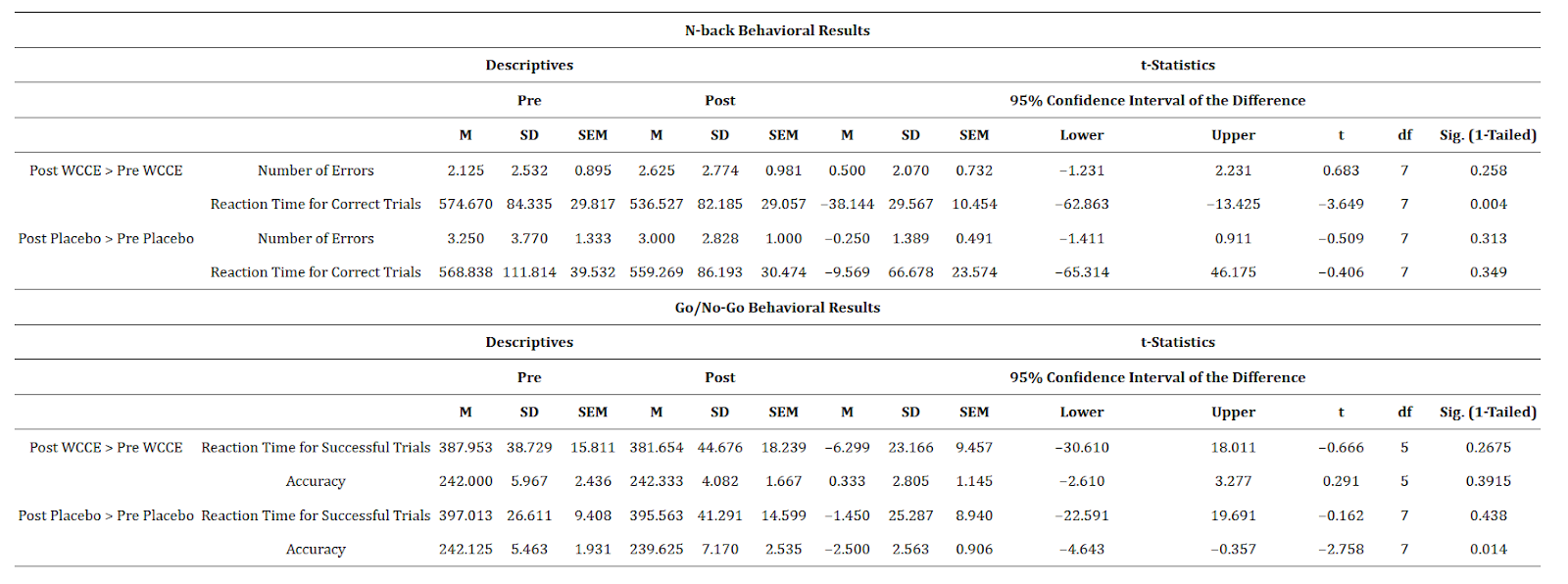

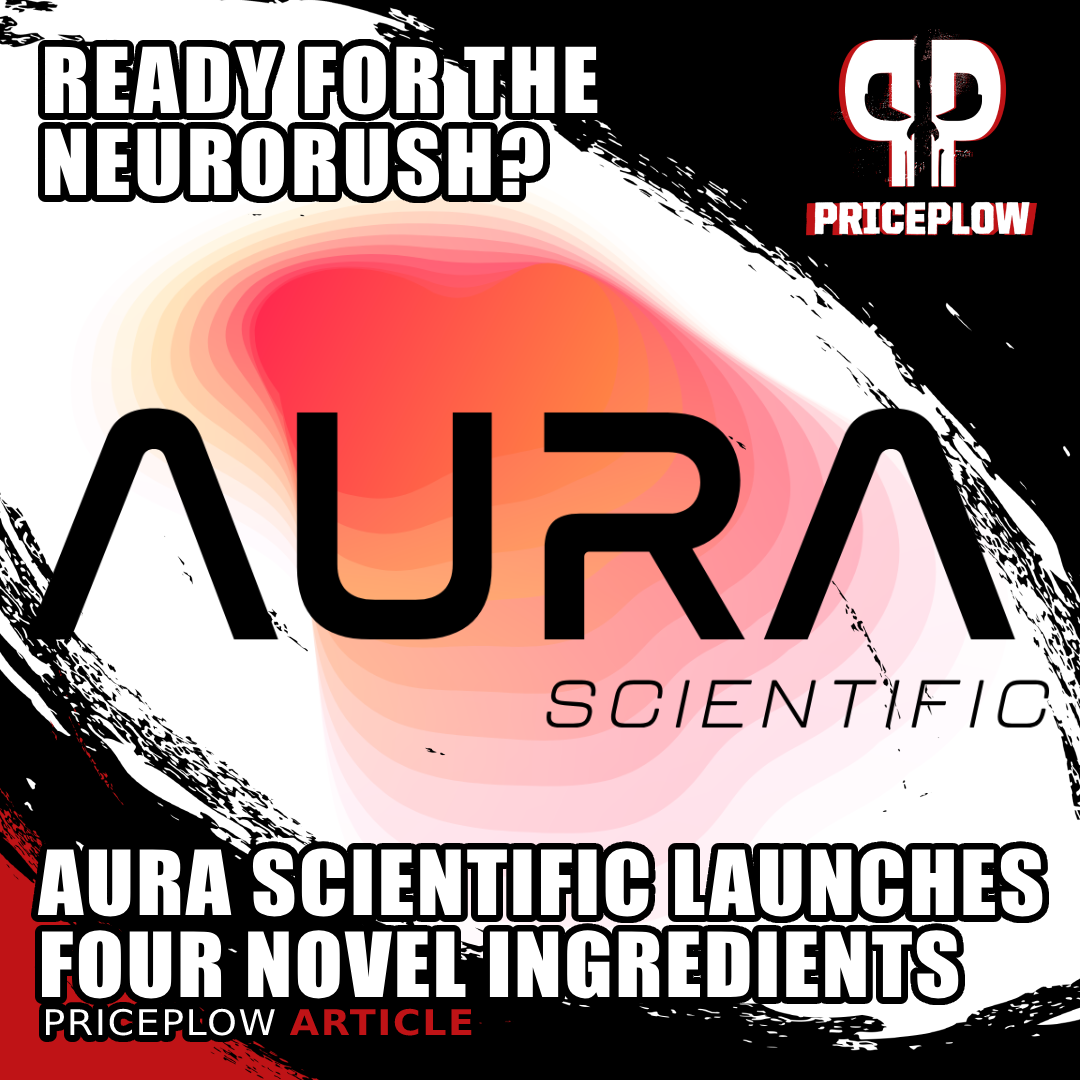
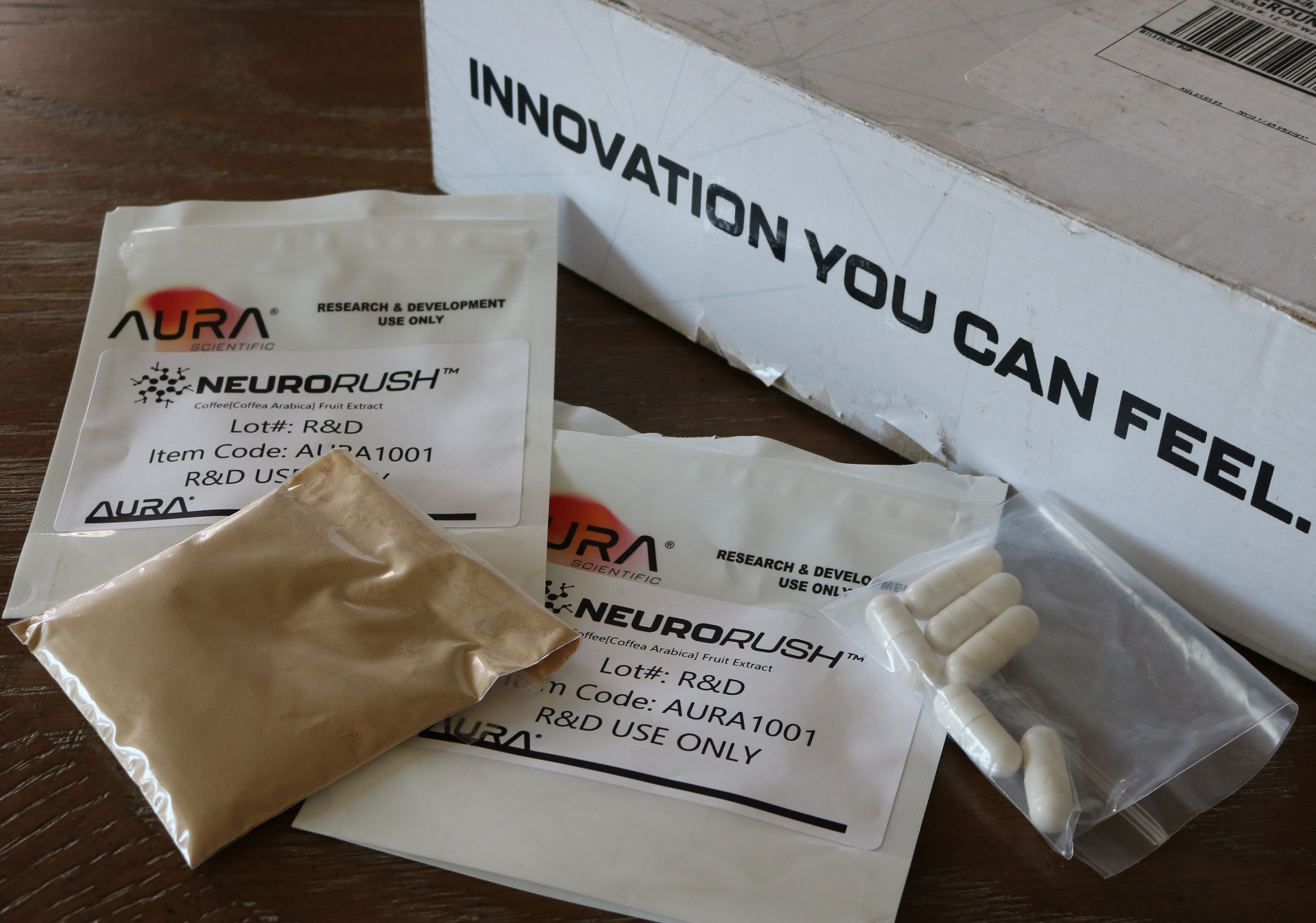
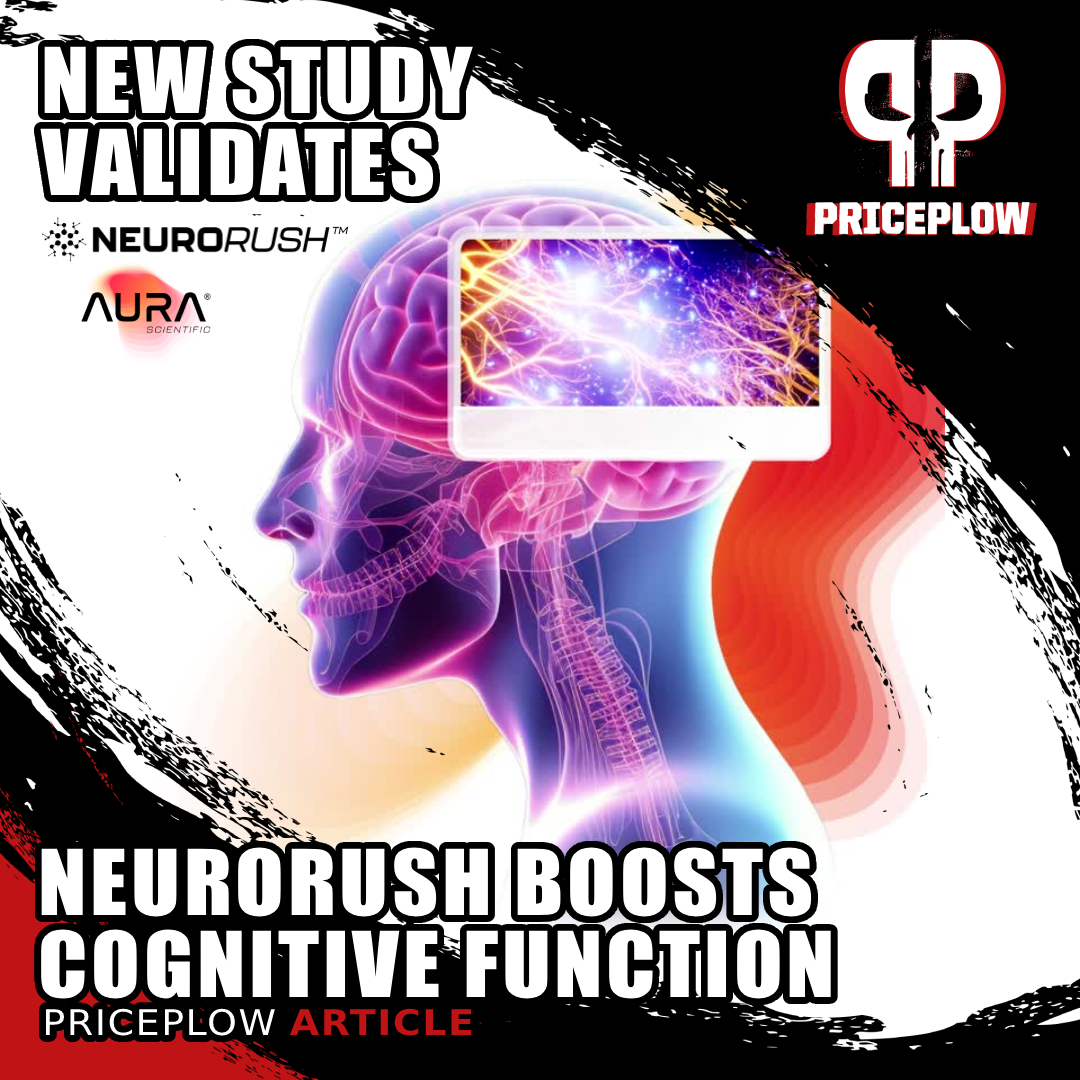
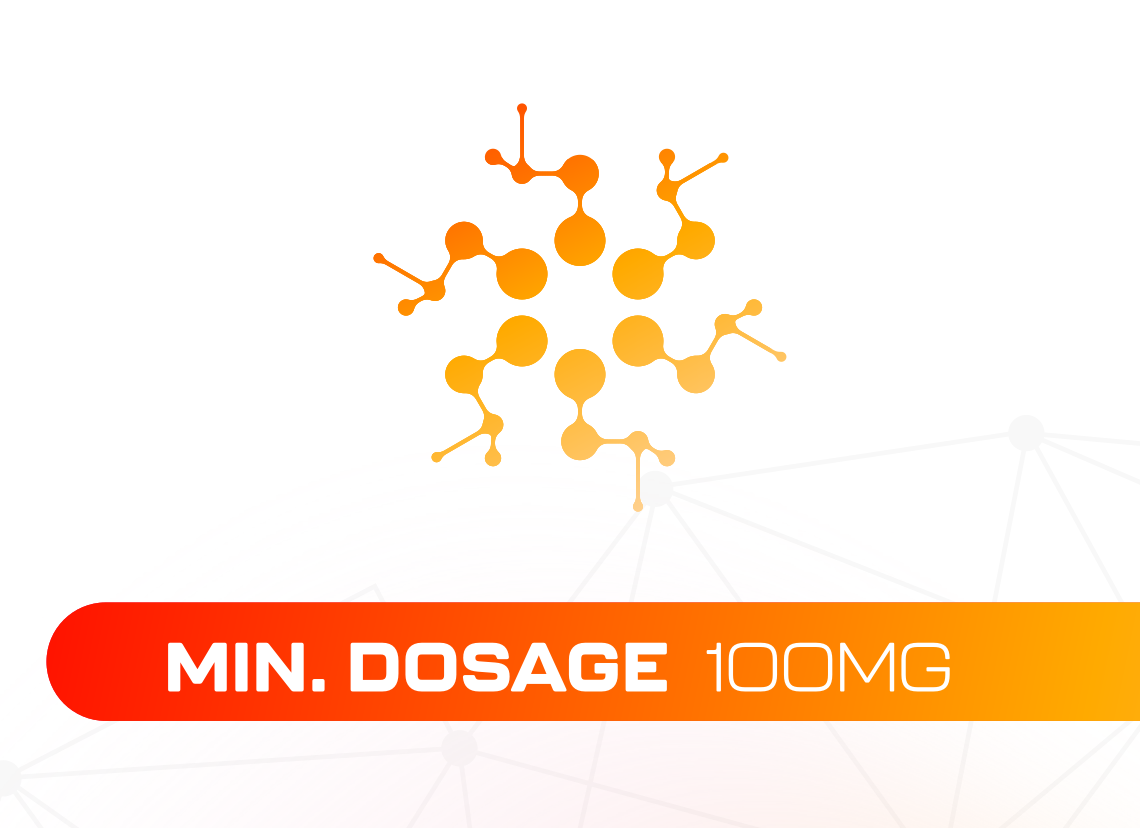
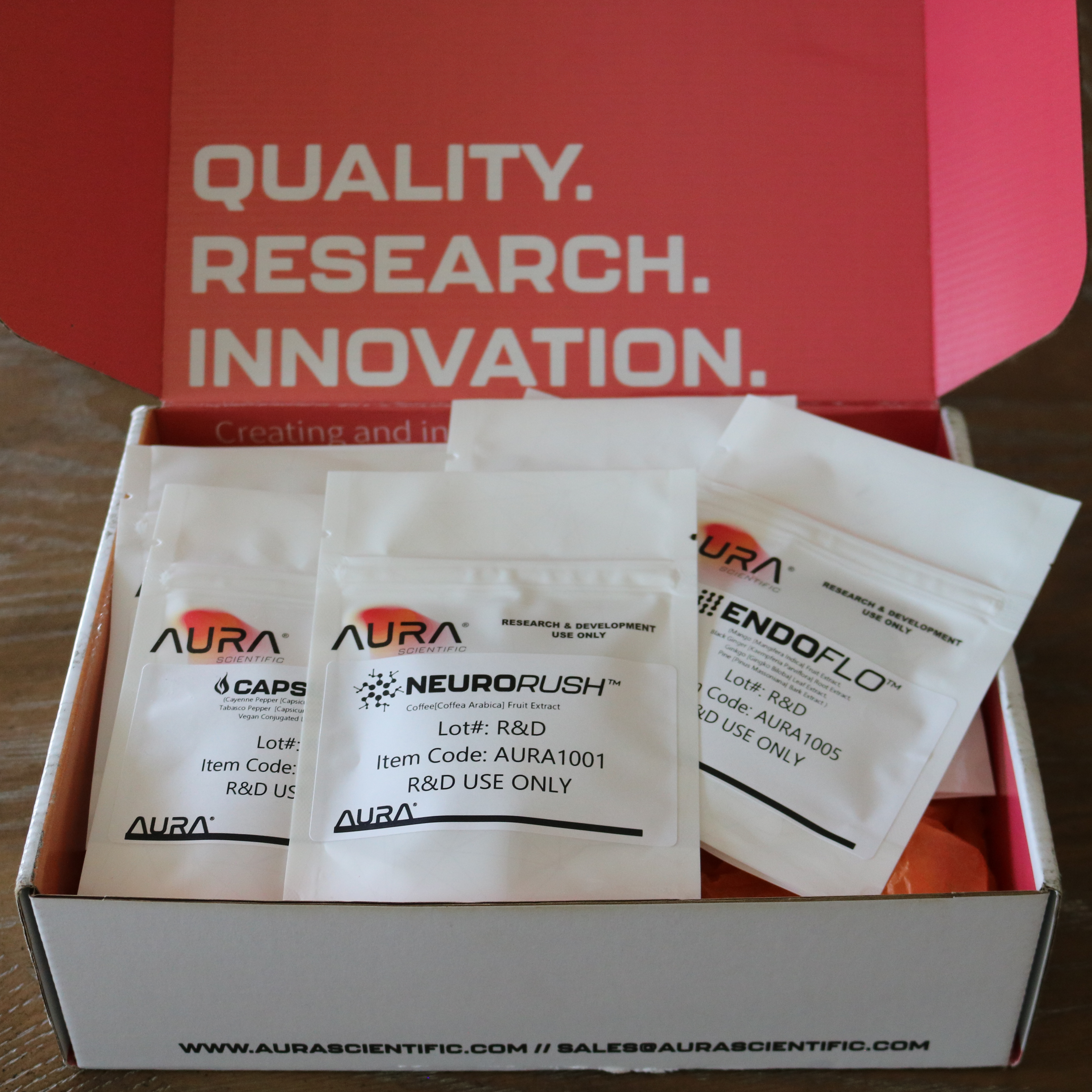



Comments and Discussion (Powered by the PricePlow Forum)